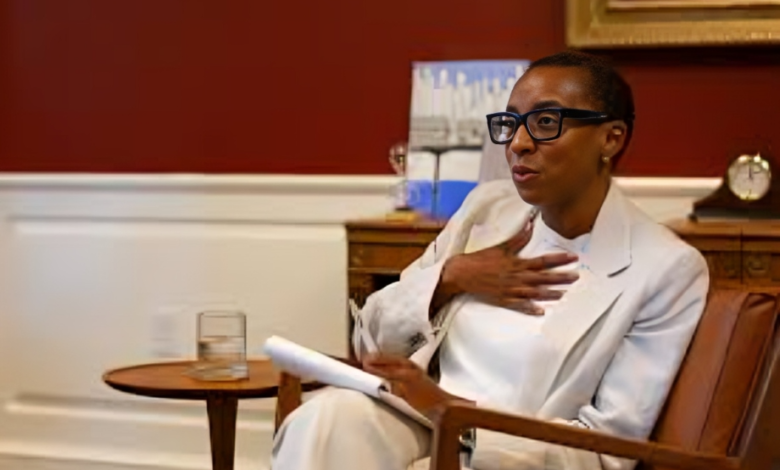Claudine Gay A Trailblazer in Academia and Leadership

Claudine Gay has emerged as one of the most influential figures in academia, breaking barriers and redefining leadership in higher education. As the first Black president of Harvard University, her journey is an inspiring tale of determination, intellectual rigor, and a commitment to fostering inclusivity. This article delves into Claudine Gay’s life, career, and impact on the academic world, highlighting why her name resonates in global educational and leadership circles.
Early Life and Background
Claudine Gay was born to Haitian immigrant parents, who instilled in her the values of hard work, education, and resilience. Her upbringing was marked by a profound respect for learning, which became the foundation of her academic aspirations. Her parents, both professionals in their respective fields—her father was an engineer, and her mother was a nurse—demonstrated the importance of perseverance in achieving one’s goals.
Growing up, Gay showed an exceptional aptitude for learning, which paved the way for her admission to Stanford University. Here, she pursued a degree in economics, graduating with distinction. This early success set the stage for her illustrious academic career.
Academic Journey and Achievements
After completing her undergraduate degree, Claudine Gay enrolled at Harvard University, where she earned her Ph.D. in government. Her doctoral research focused on the intersection of politics, race, and identity, a theme that would become central to her scholarly work.
Gay’s academic contributions are both profound and far-reaching. Her research delves into issues of political behavior, voting rights, and the dynamics of marginalized communities in the political landscape. By addressing critical societal questions, she has provided valuable insights into how race and ethnicity shape political participation and public policy.
Her work has been published in leading academic journals and has garnered widespread recognition for its depth and originality. These contributions earned her a faculty position at Stanford University, where she taught and conducted research before returning to Harvard in 2006.
Leadership at Harvard University
Claudine Gay’s return to Harvard marked the beginning of her leadership journey at one of the world’s most prestigious institutions. She served as a professor of government and African and African American studies, further solidifying her reputation as an academic powerhouse.
In 2015, Gay was appointed Dean of Social Science in the Faculty of Arts and Sciences, where she played a pivotal role in fostering interdisciplinary research and promoting diversity among faculty and students. Her visionary leadership during this tenure demonstrated her ability to address complex institutional challenges with innovative solutions.
Her most significant career milestone came in December 2022 when she was named the 30th president of Harvard University, succeeding Lawrence Bacow. This historic appointment made her the first Black person and only the second woman to hold this esteemed position in Harvard’s nearly 400-year history.
Vision and Priorities as Harvard’s President
Claudine Gay’s presidency is characterized by a forward-thinking approach to higher education. She has emphasized the importance of creating an inclusive academic environment where diverse perspectives are not only welcomed but celebrated. Her vision includes:
- Advancing Diversity and Inclusion:
Gay has consistently championed diversity, equity, and inclusion. Under her leadership, Harvard aims to break down systemic barriers and provide equal opportunities for students and faculty from all backgrounds. - Fostering Interdisciplinary Collaboration:
Recognizing the interconnected nature of global challenges, Gay advocates for interdisciplinary research that brings together experts from various fields to address pressing issues such as climate change, public health, and social justice. - Enhancing Accessibility:
Gay is committed to making Harvard more accessible to students from underprivileged communities. By increasing financial aid and expanding outreach programs, she hopes to ensure that talented individuals, regardless of their socioeconomic status, can benefit from a Harvard education. - Promoting Civic Engagement:
With her background in political science, Gay understands the importance of civic responsibility. She encourages students to engage actively in societal issues and contribute meaningfully to their communities.
Challenges and Opportunities
Claudine Gay’s presidency comes at a time when higher education faces numerous challenges, including the rising cost of tuition, debates over affirmative action, and the impact of technological advancements on traditional learning models.
One of her immediate challenges is navigating the aftermath of the Supreme Court’s decision on affirmative action, which significantly impacts diversity initiatives in higher education. Gay’s expertise and commitment to inclusion will be crucial in addressing this issue and ensuring that Harvard remains a leader in promoting equity.
Additionally, she has the opportunity to redefine the role of universities in the digital age. By embracing online learning platforms and leveraging technology, Gay aims to expand Harvard’s reach and influence beyond its traditional campus boundaries.
Recognition and Legacy
Claudine Gay’s groundbreaking appointment as Harvard’s president has received widespread acclaim from academics, policymakers, and community leaders. Her leadership is seen as a symbol of progress in an era where representation and inclusivity are paramount.
Her ability to inspire and empower others, coupled with her deep commitment to academic excellence, positions her as a transformative figure in higher education. Gay’s presidency is not just about breaking barriers; it’s about setting new benchmarks for what leadership in academia can achieve.
Personal Life and Interests
Despite her demanding career, Claudine Gay remains deeply connected to her roots and values. She often speaks about the influence of her family and cultural heritage on her worldview. In her spare time, she enjoys reading, exploring art, and spending time with her loved ones.
Her humility and approachability have endeared her to students and colleagues alike, making her a relatable and admired leader.
The Broader Impact of Claudine Gay’s Leadership
Claudine Gay’s rise to prominence is more than a personal achievement; it reflects the evolving landscape of academia and society at large. Her leadership challenges traditional norms and sets a precedent for future generations of scholars and leaders from underrepresented backgrounds.
By fostering an environment of inclusivity and innovation, Gay is not only shaping the future of Harvard but also influencing how institutions worldwide approach education and leadership. Her journey serves as a powerful reminder that diversity and excellence go hand in hand.
Conclusion
Claudine Gay stands as a beacon of hope and progress in academia. Her groundbreaking achievements, coupled with her vision for a more inclusive and equitable educational system, underscore her significance as a leader and role model.
As she continues to navigate the complexities of her role as Harvard’s president, Gay’s unwavering commitment to her principles and her ability to inspire change will undoubtedly leave a lasting legacy. Her story is a testament to the power of perseverance, the importance of representation, and the transformative impact of visionary leadership.




